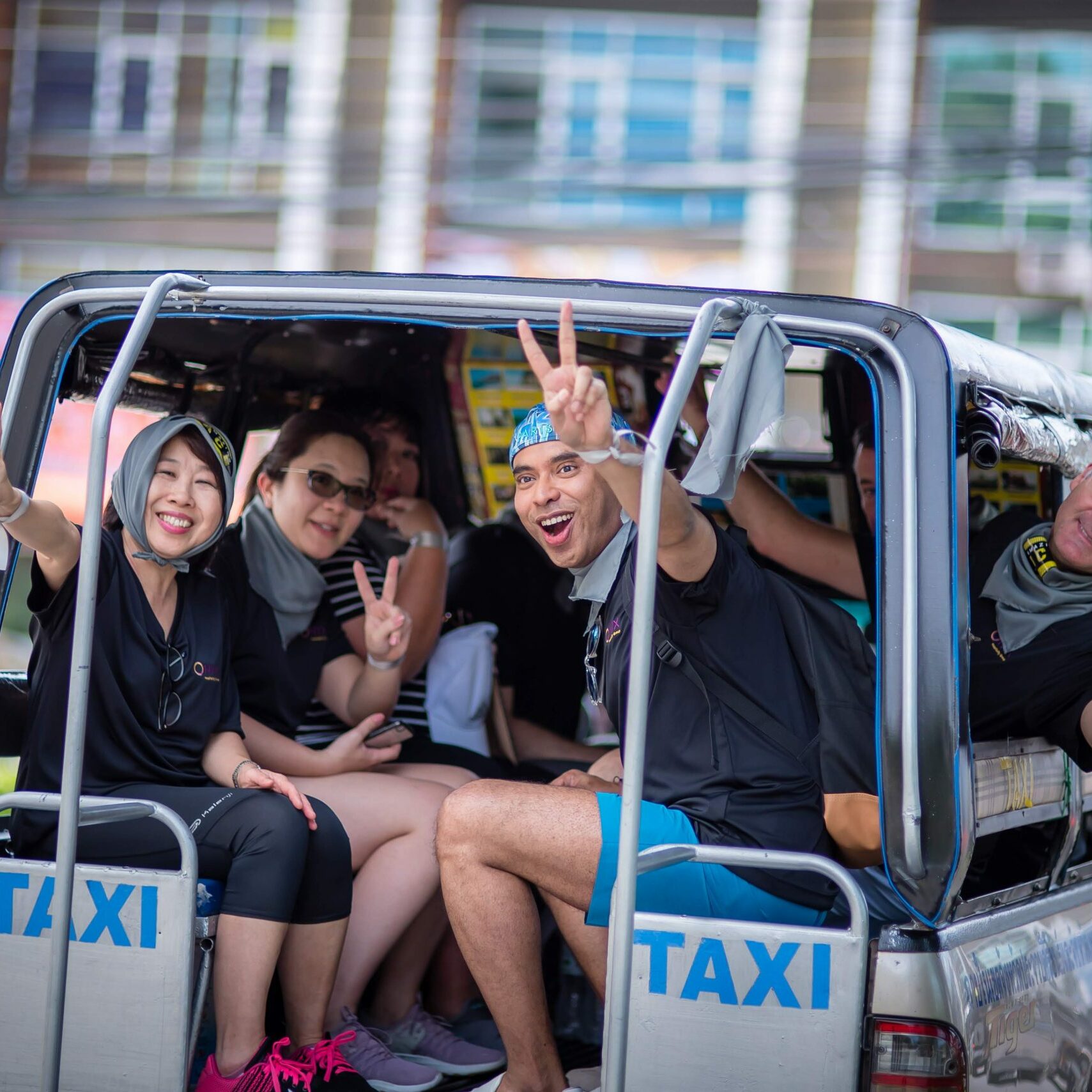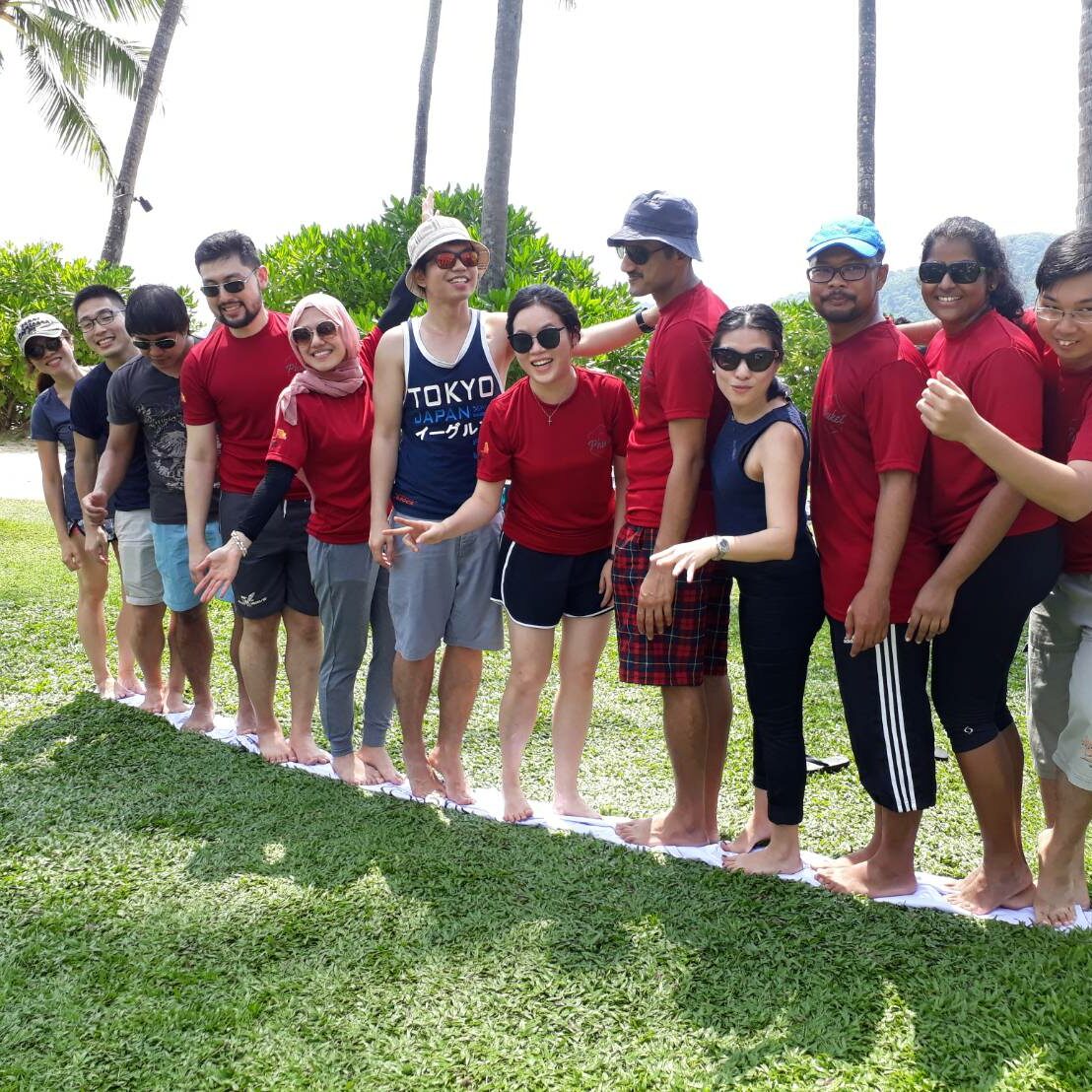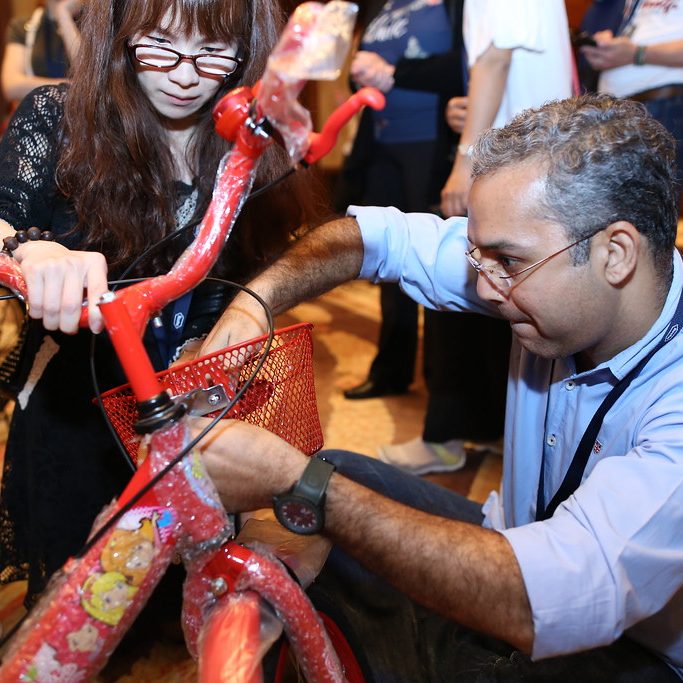A race by minivans or public transport from challenge to challenge based on the famous TV-show ‘The Amazing Race’. In this highly active and experiential program, teams are tasked to find locations and complete local cultural challenges such as boxing, dancing and cooking a local dish.
- To improve communication within the team
- To practice planning and organisation
- To consider leadership skills
- To focus on team synergy and individual roles
- To get to know each other and have a fun and enjoyable time
- To manage time and complete team challenges together
The group will be divided into teams of up to ten participants. Each team will be provided with an envelope with route instructions for their first destination, and directions for the Amazing Race. Upon reaching the first destination, a new envelope with challenge information is handed to the team, so along the way they will compete in a series of task based challenges.
All teams follow the same route and compete at the same challenges in the same order. The team that completes all challenges first wins the Amazing Race and receives a prize at the finish.
Challenges reflect the local flavour of the destination. Some may last for only a few minutes, others may be complex learning problems that keep teams working for up to an hour! In any case, they are always exciting and promise spectacular new experiences. Longer tasks include making a fruit or soap carving, playing Thai music, preparing exotic Thai food or locating, negotiating for and buying a hard to find item. Other teams may try getting a Chinese horoscope, learning a monk’s chant, counting the Buddha’s, flying a kite at one of the many beaches or putting on a Thai puppet show.
There are two types of challenges; ‘Cultural Riddles’ and ‘Cultural Activities’.
Cultural Riddles: These are questions offered at culturally interesting locations, they are related to the location and must be answered in order to receive points.
Cultural Activities: These are local cultural experiences related to the culture, are instructed by professionals in the field and must be completed in order to continue in the race. Example challenges are boxing and dancing.
Instructions during the race are handed to the teams by their facilitator informing them where to go (Route cards) and what to do (Challenge cards).
As in the TV-show there are different types of challenge instructions with Speed Bump, Road Block and Intersection being the most common in which teams either have to complete the challenge with the whole team, with one person of the team or in direct competition with another team.
As a result, teams sometimes have to wait for another team to finish or arrive to compete with. Teams may decide to take a Detour challenge sometimes instead of waiting.
If you don’t wish for teams to wait, we offer different routes for all teams as an add-on option.
Below is one example challenge instruction as provided to the teams during the activity:
Thai dancing – ‘Rum Thai Rabam’
“All members of the team must complete a speed bump challenge by joining a Thai dancing class for about 10 minutes before performing their own show in the theatre. Your facilitator will hand you your next route envelope when your Thai dancing instructor has approved your performance”
Cultural Activities List:
- Muay Thai Boxing – Teams will be shown the traditional Wai Kru and learn a series of Muay Thai moves. They will practice and then choose one person to spar in the ring with the master boxer!
- Thai Music Playing – Teams will observe a traditional Thai song played by professionals and then learn how to play these Thai instruments and replicate the song.
- Pot Making – Teams create their own design pot from clay by watching and copying the techniques from a master in the art
- Basket Weaving – Teams are shown how to weave a basket from natural materials provided to then create their own handicraft
- Silk Making – In this activity teams are taught the steps and techniques for making silk in a traditional way from the extraction of the raw silk to dissolving in boiling water and finally by feeding into the spinning reel
- Thai Puppet Dancing – Teams will watch professional puppet dancers performing a show to then learn the basics of this art and putting up their own show
- Thai Dancing – Teams must observe and then recreate the dance routine performed by Thai dancers to the best of their ability
- Umbrella Painting – Teams receive their own umbrella and follow the basic techniques from their instructor to paint their own creative design.
- Coconut Milk Making – In this traditional activity, teams first grate the flesh from a coconut to then squeeze it through a sieve and collect it in a bottle until it’s full, the fresh milk is ready to drink!
- Flower Garland Making – Teams will be shown how to thread a traditional flower garland. Their task is to make the flower garland and hang it around the necks of everyone in the team.
- Temple Quest – Teams visit a well-known temple. Their task is to search the location and find answers to multiple questions about this location and receive a blessing from a monk.
- Thai Street Stall – Teams receive a list of local snacks and drinks they need to buy and consume on a local street stall market during the race.
- Fruit Shake Making – Teams are tasked to find specific types of fruit and prepare them into a shake following a recipe
- Papaya Salad Making – Teams must observe how to make traditional ‘Som-Tam’ – Thai papaya salad, then they need to recreate the dish and present it to the master for tasting and judging
- Takro – Teams receive a lesson in Takro, the popular Thai ball game, in which they learn how to keep the ball high within the team. They’re then challenged to keep it high for a period of time or kicks
- Kite Flying – Teams will be shown how to make a traditional bamboo kite. Their task is to make their team kite and then make it fly for 1 minute
- Batik Painting – Members of each team learn how to paint following the traditional Batik painting method and create their own piece of art
- Thai Sweet Making – Teams are tasked to first observe and then recreate a traditional Thai sweet desert
- T-Shirt Painting – Teams are equipped with T-shirts and paint and instructed to create a design related to the location or a theme
The locations and routing for the race is the same for all teams. Teams travel by public transport or minivan with driver. As they explore, the teams will get the chance to visit some of the most important and interesting sites around the location. Places vary per location but usually include famous sites like temples, local cultural sites of interest and various adventure activity locations whilst interacting with the locals.
The winning team is the first to arrive at the finish whilst having completed the most challenges.
Insurance and instructor supervision at all times is an important safety factor, and in the event of an emergency of team member withdrawal, transport and medical backup will be standing by.
The event briefing takes place at the starting point of the race, usually in a meeting room or lobby of the client’s hotel or a restaurant. The group is separated into teams and introduced to their facilitators, then the lead facilitator gives an introduction of the event including (safety) instructions and objectives for the activity.
During the debrief, the facilitator discusses the event challenges and asks each team questions to assess their performance before announcing the winning team (if applicable).
Briefing and debrief usually take around 15 minutes each but can be extended for more in-depth analysis of team performance.
The half day program is up to 4 hours and includes up to 5 challenges and the full day program is up to 8 hours and includes up to 10 challenges.
Market Barter – Thai Shopping game
Lunch or dinner in a local restaurant
T-shirts with your logo
Banners / Flags / Caps
Gifts for all participants
Photographer or Videographer
Conference room rental and AV set up
09.00 am – Event brief by lead facilitator
09.15 am – Teams receive their first route instruction and leave for their first location challenge
Teams have 3+ hours to complete as many challenges as possible and return to the finish first to win the race
12.15 pm – Teams must head to the finish
12.30 pm – Event de-brief, awarding ceremony and group photo
01.00 pm – End of the program
Max People
Hours
Challenges
People per Team
Below are three different options for the Amazing Race with rates to match your budget and requirements. The Bronze option is a fixed program with few inclusions but the Silver and Gold packages include extra benefits and allow selection of some or all challenges. On the pricing page we offer further optional extras. The full day activity will have up to double the number of challenges.
All options include
One Western lead event facilitator
Ice-breaking activities
One bottle of water per person, first aid kits, rain coats
BRONZE
3 Cultural Riddles
2 Cultural Activities
One facilitator per challenge station
*By foot and no facilitators with teams
SILVER
2 Cultural Riddles
3 Cultural Activities
One facilitator per 10 pax
Bronze inclusions+
+Market Barter challenge
+Transportation or budget for transport
+Prizes for winning team (local handicraft or medals)
+Free photos taken by facilitator
+Pre-event meeting
GOLD
1 Cultural Riddle
4 Cultural Activities
One facilitator per 10 pax
Silver inclusions+
+Trophy for winning team
+Team flags to keep
+Colored headbands to use




